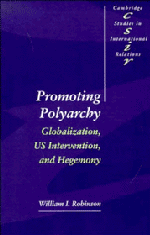Book contents
- Frontmatter
- Contents
- Acknowledgments
- List of acronyms and abbreviations
- Introduction. From East–West to North–South: US intervention in the “new world order”
- 1 From “straight power concepts” to “persuasion” in US foreign policy
- 2 Political operations in US foreign policy
- 3 The Philippines: “Molded in the image of American democracy”
- 4 Chile: Ironing out “a fluke of the political system”
- 5 Nicaragua: From low-intensity warfare to low-intensity democracy
- 6 Haiti: The “practically insolvable problem” of establishing consensual domination
- 7 Conclusions: The future of polyarchy and global society
- Notes
- Select bibliography
- Index
- CAMBRIDGE STUDIES IN INTERNATIONAL RELATIONS
4 - Chile: Ironing out “a fluke of the political system”
Published online by Cambridge University Press: 05 July 2011
- Frontmatter
- Contents
- Acknowledgments
- List of acronyms and abbreviations
- Introduction. From East–West to North–South: US intervention in the “new world order”
- 1 From “straight power concepts” to “persuasion” in US foreign policy
- 2 Political operations in US foreign policy
- 3 The Philippines: “Molded in the image of American democracy”
- 4 Chile: Ironing out “a fluke of the political system”
- 5 Nicaragua: From low-intensity warfare to low-intensity democracy
- 6 Haiti: The “practically insolvable problem” of establishing consensual domination
- 7 Conclusions: The future of polyarchy and global society
- Notes
- Select bibliography
- Index
- CAMBRIDGE STUDIES IN INTERNATIONAL RELATIONS
Summary
Mr. Minister, you come here speaking of Latin America, but this is not important. Nothing important can come from the South. History has never been produced in the South. The axis of history starts in Moscow, goes to Bonn, crosses over to Washington, and then goes to Tokyo. What happens in the South is of no importance. You're wasting your time.
Henry Kissinger, speaking to Chilean Foreign Minister Gabriel Valdes, June 1969From dictatorship to “redemocratization” and the US role
“I don't see why we need to stand by and watch a country go communist because of the irresponsibility of its own people,” declared National Security Advisor Henry Kissinger in June 1970. Kissinger was referring to the election that year of Salvador Allende as president of Chile. For Kissinger, the election of a self-declared socialist “represented a break with Chile's long democratic history,” the result of “a fluke of the Chilean political system.” What followed was one of the darkest chapters in inter-American relations: a massive US destabilization campaign against the Allende government, culminating in the bloody 1973 military coup. For fifteen years, successive US administrations propped up the dictatorship of General Augusto Pinochet. Then, in the mid-1980s, on the heels of the “success” in the Philippines, policymakers switched tracks and began to “promote democracy” in Chile.
The coup in Chile was part of a general pattern in Latin America of military takeovers in the 1960s and 1970s, in the face of mass struggles against ubiquitous social and economic inequalities and highly restricted “democracies.”
- Type
- Chapter
- Information
- Promoting PolyarchyGlobalization, US Intervention, and Hegemony, pp. 146 - 200Publisher: Cambridge University PressPrint publication year: 1996



